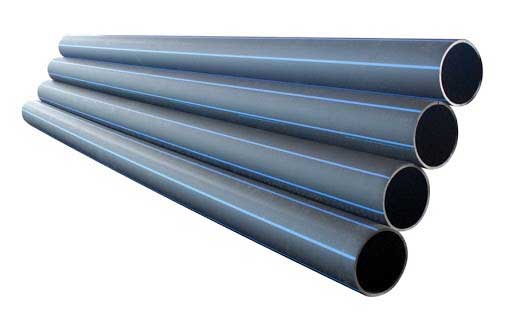How American Plastics HDPE Pipe Manufacturing Maintains Sustainability
Wiki Article
Comprehending the Trick Perks of HDPE Pipe for Water and Wastewater Administration
The use of HDPE pipeline in water and wastewater administration provides numerous advantages that merit consideration. Its exceptional durability and long life expectancy make it a favored option for many jobs. In addition, the product's resistance to corrosion and chemical damages improves its dependability in different atmospheres. Nonetheless, the benefits prolong past just long life and resistance. Exploring its cost-effectiveness and environmental effect discloses even much more engaging reasons for its prevalent fostering in modern frameworkExtraordinary Toughness and Durability

HDPE pipeline stands apart for its outstanding toughness and long life, making it a preferred selection in water administration systems. Created from high-density polyethylene, these pipelines can hold up against significant pressure and stress, ensuring trusted performance gradually. Their durable nature allows them to withstand extreme ecological problems, including temperature level fluctuations and soil motions, which can create various other products to stop working.
The life expectancy of HDPE pipes often surpasses 50 years, providing a cost-effective remedy for districts and markets alike. Additionally, the material's light-weight homes simplify setup, minimizing labor prices and durations. This longevity lessens the requirement for regular fixings or replacements, additionally improving its financial charm.
In water monitoring applications, the reliability of HDPE pipelines suggests less interruptions and boosted service connection, making them indispensable to sustainable infrastructure advancement. The combination of sturdiness and long life strengthens HDPE's function as a foundation in efficient water monitoring services.

Resistance to Rust and Chemical Damage
While several materials surrender to deterioration and chemical damages in time, HDPE pipes exhibit exceptional resistance, making them suitable for different water administration applications. This resilience originates from the molecular structure of high-density polyethylene, which is inherently non-reactive and does not rust like steels or deteriorate from direct exposure to severe chemicals. Because of this, HDPE is very efficient in environments with aggressive compounds, such as wastewater systems that may have acids, bases, and natural solvents.
Additionally, HDPE pipes can hold up against ecological variables such as soil acidity and saline conditions, better enhancing their viability for varied applications (American Plastics HDPE Pipe for Oilfield). Their capability to preserve structural integrity over time lowers the threat of leaks and failures, which is critical in guaranteeing the safety and security and reliability of water circulation and wastewater administration systems. As a result, the resistance to rust and chemical damages considerably adds to the overall effectiveness and longevity of HDPE piping services
Cost-Effectiveness and Economic Advantages
When considering the economic ramifications of water administration systems, the cost-effectiveness of HDPE pipes ends up being apparent. These pipelines supply lower setup and maintenance prices compared to conventional products like metal or concrete. Their lightweight nature simplifies transportation and setup, causing decreased labor expenditures. Furthermore, HDPE pipelines exhibit a lengthy lifespan, typically going beyond half a century, which equates to fewer substitutes and lasting savings.Furthermore, the resistance of HDPE to corrosion and chemical damages decreases the need for pricey fixings and substitutes. The pipelines also sustain efficient water flow, lowering energy prices connected with pumping systems. By alleviating leaks and water loss, HDPE pipelines add to considerable financial benefits for towns and markets alike. Overall, the preliminary financial investment in HDPE piping can yield significant economic returns over the life expectancy of the water monitoring system, making it a sensible choice for sustainable framework development.
Environmental Sustainability and Lowered Influence

Convenience and Adaptability in Installment
As a result of their special residential or commercial properties, HDPE pipelines offer impressive versatility and versatility in installation, making them ideal for a wide variety of applications. Their light-weight nature permits for simpler handling and transport, lowering labor expenses and setup time. HDPE pipes can be curved and formed to fit numerous surfaces and project needs, which is specifically useful in challenging atmospheres.Furthermore, their resistance to deterioration and chemical damage allows for installment in diverse setups without the requirement for specialized safety layers. The capacity to fuse joints develops a continuous, leak-free system, enhancing the overall stability and dependability of the setup. HDPE's adaptability likewise accommodates ground movement, minimizing the danger of damage in areas vulnerable to changing soil. On the whole, these characteristics make HDPE pipes not just functional however additionally a favored choice for water and wastewater monitoring systems.
Frequently Asked Inquiries
Exactly How Does HDPE Pipe Compare to PVC in Water Monitoring Applications?
HDPE pipeline supplies remarkable adaptability, resistance to rust, and sturdiness contrasted to PVC. Its lighter weight helps with easier installation, while its lengthy life expectancy decreases substitute costs, making HDPE a preferred choice in water management applications.What Is the Lifespan of HDPE Piping Under Normal Conditions?
Under typical problems, HDPE pipelines can have a life expectancy ranging from 50 to 100 years. Their toughness and resistance to corrosion add to their long-term efficiency in different applications, making them a dependable option for infrastructure.Are HDPE Pipes Recyclable After Their Life Span?
Yes, HDPE pipelines are recyclable after their service life. Pipe Manufacturing Midland TX. They can be refined and repurposed into brand-new products, greatly reducing environmental impact and promoting sustainability within the sector, making them an eco-friendly option for piping solutionsWhat Is the Installation Process for HDPE Piping?
The installment process for HDPE pipes includes site preparation, trenching, pipe fusion or mechanical joining, backfilling, and stress testing. Appropriate strategies assure a long lasting and efficient system for moving water and wastewater successfully.Can HDPE Pipeline Be Used for Both Potable and Non-Potable Water Solutions?
Yes, HDPE pipes can be utilized for both safe and clean and non-potable water supply. Their adaptability, sturdiness, and resistance to deterioration make them appropriate for various applications, guaranteeing risk-free and effective transport of water in various contexts.Report this wiki page